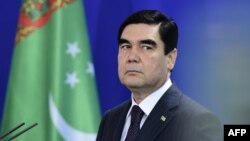Turkmenistan will hold presidential election in February
| Publisher | Radio Free Europe/Radio Liberty |
| Publication Date | 15 October 2016 |
| Cite as | Radio Free Europe/Radio Liberty, Turkmenistan will hold presidential election in February, 15 October 2016, available at: https://www.refworld.org/docid/5975a10411.html [accessed 22 May 2023] |
| Disclaimer | This is not a UNHCR publication. UNHCR is not responsible for, nor does it necessarily endorse, its content. Any views expressed are solely those of the author or publisher and do not necessarily reflect those of UNHCR, the United Nations or its Member States. |
October 15, 2016
 Turkmen President Gurbanguly Berdymukhammedov
Turkmen President Gurbanguly Berdymukhammedov
Turkmenistan will hold a presidential vote on February 12, state media reported on October 12.
The announcement comes a month after Turkmenistan passed constitutional changes which removed barriers to President Gurbanguly Berdymukhammedov's lifelong rule.
The election date was approved by the Turkmen parliament on October 15.
The amendments, signed by Berdymukhammedov last month after approval by the rubber-stamp parliament and the Council of Elders on September 14, scrap a rule that barred anyone over 70 from presidential ballots in the tightly controlled Central Asian country.
They also extend future presidential terms to seven years, from the current five.
State news agency TDH said that the Democratic Party, the Party of Industrialists and Entrepreneurs, and the Agrarian Party would all present their own presidential candidates.
All three parties strongly support Berdymukhammedov's rule.
Berdymukhammedov, 59, won elections by landslides in 2007 and 2012 after coming to power following the death of Sapurmurat Niyazov in late 2006.
Gas-rich Turkmenistan is one of the most isolated countries in the world and has never held an election that was deemed fair and democratic by the Organization for Security and Cooperation in Europe.
Rights groups say dissent is not tolerated, government critics are routinely jailed or placed in psychiatric hospitals, and the country has no independent media.
Based on reporting by AFP
Link to original story on RFE/RL website
